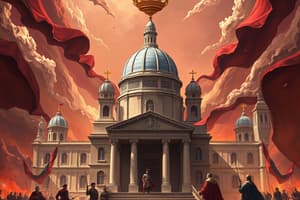Podcast
Questions and Answers
¿Quién era el líder absoluto y supremo con poderes políticos, militares, religiosos y judiciales durante el período de la monarquía romana?
¿Quién era el líder absoluto y supremo con poderes políticos, militares, religiosos y judiciales durante el período de la monarquía romana?
- El Senado
- Los Comitia Curiata
- El Rey (correct)
- El Colegio de Sacerdotes
¿Cuál era el papel del Senado durante el periodo de la monarquía romana?
¿Cuál era el papel del Senado durante el periodo de la monarquía romana?
- Era el encargado de interpretar la voluntad de los dioses a través de la observación de fenómenos naturales.
- Era un cuerpo consultivo compuesto por patricios que aconsejaban al rey y preservaban las tradiciones romanas. (correct)
- Era responsable del cuidado de la diosa Vesta y los rituales romanos.
- Era el líder absoluto con poder político, militar, religioso y judicial.
¿Cuál era el papel del Senado durante la monarquía romana?
¿Cuál era el papel del Senado durante la monarquía romana?
- Era un cuerpo consultivo compuesto por plebeyos que aconsejaban al rey.
- Era un cuerpo judicial encargado de juzgar a los ciudadanos romanos.
- Era un cuerpo ejecutivo encargado de gobernar y administrar Roma
- Era un cuerpo consultivo compuesto por patricios que aconsejaban al rey y preservaban las tradiciones romanas. (correct)
¿Qué órgano consultivo estaba compuesto por patricios que asesoraban al rey y preservaban las tradiciones romanas durante la monarquía?
¿Qué órgano consultivo estaba compuesto por patricios que asesoraban al rey y preservaban las tradiciones romanas durante la monarquía?
¿Qué era el Comitia Curiata durante el periodo de la monarquía romana?
¿Qué era el Comitia Curiata durante el periodo de la monarquía romana?
¿Qué poderes tenía el rey durante la monarquía romana?
¿Qué poderes tenía el rey durante la monarquía romana?
¿Quiénes eran los flamines durante el periodo de la monarquía romana?
¿Quiénes eran los flamines durante el periodo de la monarquía romana?
¿Qué era el Comitia Curiata durante la monarquía romana?
¿Qué era el Comitia Curiata durante la monarquía romana?
¿Cuál era el papel de los augures en el Colegio de Sacerdotes durante la monarquía romana?
¿Cuál era el papel de los augures en el Colegio de Sacerdotes durante la monarquía romana?
Flashcards are hidden until you start studying
Study Notes
- Roman political institutions during the monarchy period consisted of the king, the Senate, the Comitia Curiata, and the College of Priests.
- The king was an absolute and supreme leader with political, military, religious, and judicial powers.
- The Senate was a consultative body composed of patricians who advised the king and preserved Roman traditions.
- The Comitia Curiata approved the law proposed by the Senate that granted the king supreme power to govern and exercise military command in Rome.
- The College of Priests was composed of jurists, pontiffs, augurs, vestal virgins, and flamens.
- The pontiffs were in charge of sacred legal formulas and the interpretation of the ius.
- The augurs interpreted the will of the gods through the observation of natural phenomena.
- The vestal virgins were responsible for the care of the goddess Vesta and Roman rituals.
- The flamens were ancient priests in charge of rituals and consecrations.
- The monarchy period lasted from 753/754 BC until the patrician revolution in 509 BC.
Studying That Suits You
Use AI to generate personalized quizzes and flashcards to suit your learning preferences.




